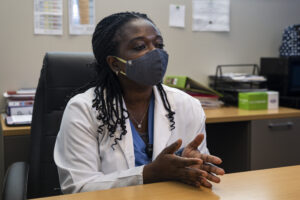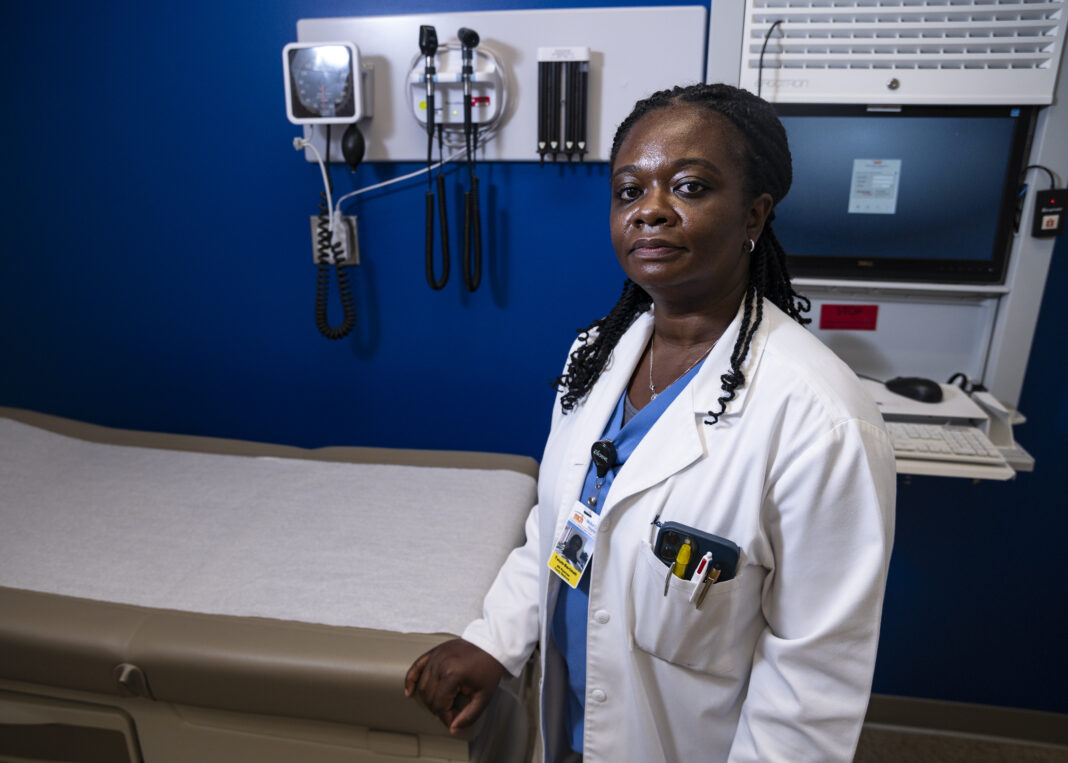Dr. Mavis Twum-Barimah is now in select company.
She is one of 407 American Board of Obesity Medicine-certified diplomates in the state of Texas. Twum-Barimah has been with Medical Center Hospital ProCare for six years and practices out of the 6030 W. University Blvd. clinic.
“Obesity is one of the prevailing chronic diseases that we see as primary care patients, majority of my patients struggle with overweight and obesity. And we know that obesity (is) also associated with other chronic problems like diabetes, high blood pressure, high cholesterol, heart disease, cancers by the liver. I felt like I should be able to treat the obesity, to be able to prevent these other chronic problems that my patients suffer from,” she said.
A hospital news release said certification as an ABOM diplomate signifies special knowledge in the practice of obesity medicine and distinguishes a physician as having achieved competency in obesity care. Each ABOM diplomate undergoes rigorous training and an extensive examination process.
The Centers for Disease Control and Prevention detailed that more than 42 percent of U.S. adults cope with obesity, which is associated with a higher risk for heart disease, cancer, diabetes, stroke and other musculoskeletal and vascular problems. Obesity has been officially recognized as a disease by the American Twum-Barimah is a board-certified family medicine physician. Born in Ghana, Twum-Barimah moved here for her undergraduate studies at Wayne State and went to medical school there as well. Her residency was in Oak Park, Ill., and she moved to Odessa for her first job.
“We are extremely fortunate to have Dr Mavis practicing here in our community. This special certification is a testament to her commitment in providing her patients with the best care possible,” David Garcia, Family Health Clinic Executive Director, said in an email.
Twum-Barimah said practicing in Odessa is similar to caring for patients anywhere.
“… (I’m) passionate about underserved medicine and that’s why I chose to work at. This is an FQHC (Federally Qualified Health Center), so we do see patients that have no insurance and low income, Medicare, Medicaid,” Twum-Barimah added.

Being a family medicine doctor, Twum-Barimah sees a diverse group of people.
“… I do see kids to adults, the elderly. I do see men; women. We treat a variety of different diseases …,” she said.
Obesity is when you have a body mass index that’s greater than 30. According to the Centers for Disease Control and Prevention, BMI is a person’s weight in kilograms divided by the square of height in meters.
Going through medical school, Twum-Barimah said there isn’t specific training for treating obesity.
“… We are taught to treat the other chronic problems, but we know that obesity is usually associated with these problems so I feel like having that specialization and extra training, I can provide a comprehensive care for my patients that have obesity,” Twum-Barimah said.
She is able to offer nutrition education, prescribe physical activity and behavior modification to help them with their weight loss efforts, and then prescribe medication if it’s appropriate for weight loss.
With obesity can come high blood pressure, diabetes, high cholesterol and other ailments. Twum-Barimah said most of her patients have these issues.
“Most times as primary doctors we’ll focus on the high blood pressure, diabetes, cholesterol, and then, oh, you should really exercise and eat better, but patients (ask) what do you mean by eating better. You need to be able to explain and you’ll be able to tell them eating this particular diet might be better for you given the other conditions you have, and maybe this is how many calories you should eat,” how many days a week they should exercise, what type of exercise they should do, whether they should do strength training and how many days a week, Twum-Barimah said.

“I feel like with this specialization and with this extra training I’m able to focus on treating obesity specifically and not just tell patients just eat better and exercise and the weight will go away, because we know that obesity is not just about lifestyle is part of it, but genetics, the environment, hormones, certain medicines that patients take for other problems can also cause them to gain weight,” she added.
The environment can be that you live somewhere that it takes a long time to go grocery shopping, or you don’t have access to fresh food, you get food from a food bank or you live in a city that’s not conducive to exercise, she said.
If she sees a patient struggling with obesity, Twum-Barimah said she reviews their medications to make sure they’re not taking some that potentially contribute to weight gain.
“I try to individualize my care, so I don’t give a generalized prescription for everybody. I focus on where you are at and then we make small increments. So if you are not exercising at all, I tell you, well let’s start moving more; maybe walk 10 minutes a day, and increase it by five minutes every day and work your way up.”
Being overweight can restrict you, but moving can help reduce your weight, she said.
“I’ve had patients that because of the obesity they are in a wheelchair, so (they can’t) really exercise … As an obesity medicine physician, I am actually trained that you can actually exercise in a wheelchair, that maybe you can move your arms, you can move your legs and that’s an activity that can help with the weight loss …,” Twum-Barimah said.
She may not start with exercise, but begin with managing their diet to help them lose a little bit of weight to the point where they can start exercising.
Twum-Barimah noted that there are four pillars to medical weight loss — nutrition, physical activity, exercise and behavior modification.
“… I do prescribe anti-obesity medications for patients that are appropriate given the other comorbidities,” she said. “We make sure there’s no medication interaction; that there’s no contraindication. There are certain medicines that patients cannot be on based on high blood pressure, kidney disease and stuff like that, so we look at all that. But if it’s an appropriate patient, yes medication can be part of the treatment plan. We also do refer for bariatric surgery if needed.”
“If a patient meets the recommendation for bariatric surgery, we definitely do discuss it and we refer and then we are actually able to follow them up after the surgery to make sure that they are meeting their weight loss goals that they’re able to maintain that weight and prevent weight regain,” Twum-Barimah added.
She took the board exams in February of this year, and got her certification in April. Before that, she said she was doing a little weight management and offering separate visits for weight loss consultation.
“I wasn’t certified for to be a weight loss doctor, but I decided to get that extra training so that I can better take care of patients and then have more resources,” Twum-Barimah said.
“… Being an obesity doctor, a part of our training is being sensitive to talking about weight so we actually do motivational interviewing. I approach it from your other chronic issues that you may have. Maybe you have sleep apnea and I will tell you we know that sleep apnea is associated with obesity, are you concerned about your weight? And I tell you, I am actually an obesity medicine specialist and if you want us to talk about this today, we can start and then bring you back to do a full consultation. Is that something you might be interested in?”
Patients may decide that’s something they want to pursue, or say they’ll think about it.
“I feel like most patients are open and actually happy that I bring it out,” Twum-Barimah said.




